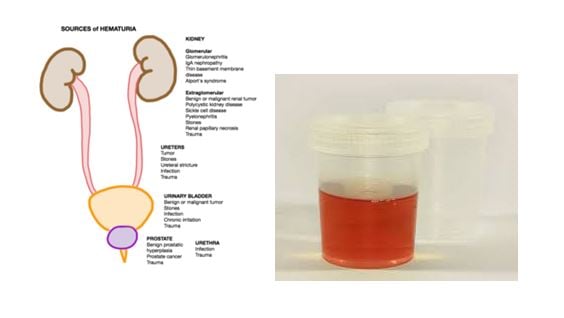Blood in Urine
Patients can present to an urologist because they have noticed blood in the urine(visible haematuria), or after being referred by another doctor because urine routine tests have shown blood under the microscope (microscopic haematuria).
There is a poor correlation between the degree of haematuria and the severity of any underlying cause and hence any amount of blood in the urine has to be investigated.
Blood in the urine can come from anywhere in the urinary tract: from the kidneys at the top down to the urethra (tube that carries urine from the bladder to the exterior).
There is a very long list of possible causes, but infections, stones, tumours (kidney cancer, bladder cancer, prostate cancer) or trauma (injury) account for the majority of cases.
The most common cause of a false positive finding of haematuria is contamination of the urine sample with menstrual blood. Certain food dyes and beetroot can also make the urine red.
Several drugs such as Pyridium (for pain relief of the urinary tract) and the anti-tuberculosis drug rifampicin change the colour of the urine to orange and can be confused with haematuria.
Investigations
All cases of haematuria should be fully investigated in order to identify the underlying cause.
Your urologist will examine you and do further tests like urine routine analysis(if not done already), urine culture, blood test to check renal function and haemoglobin levels and ultrasound or CT scan of the abdomen. Depending on the cause, you may be advised to get a cystoscopy done.
Treatment
There is no single treatment of haematuria, as different causes will be treated differently. In cases of very heavy haematuria, the blood in the urine can form clots that can block the urethra and prevent bladder emptying. This leads to the painful condition of clot retention. In these instances, it is often necessary to admit the patient and insert a large catheter and to irrigate the bladder with fluid to remove the clots. This is a temporary measure; the underlying cause will still need to be addressed as in any other case.









